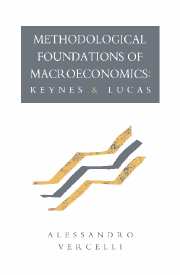Book contents
- Frontmatter
- Contents
- Preface
- List of abbreviations
- 1 Introduction
- Part 1 Methodological foundations of macroeconomics
- Part II Keynes after Lucas
- 8 Lucas's scientific paradigm
- 9 Lucas's heuristic model
- 10 The real equilibrium business cycle and Lucas's attempt at a synthesis
- 11 Keynes's heuristic model: general observations
- 12 Money and production in Schumpeter and Keynes: two dichotomies
- 13 Keynes's heuristic model: methodological aspects
- 14 Conclusions
- References
- Subject index
- Author index
14 - Conclusions
Published online by Cambridge University Press: 05 January 2012
- Frontmatter
- Contents
- Preface
- List of abbreviations
- 1 Introduction
- Part 1 Methodological foundations of macroeconomics
- Part II Keynes after Lucas
- 8 Lucas's scientific paradigm
- 9 Lucas's heuristic model
- 10 The real equilibrium business cycle and Lucas's attempt at a synthesis
- 11 Keynes's heuristic model: general observations
- 12 Money and production in Schumpeter and Keynes: two dichotomies
- 13 Keynes's heuristic model: methodological aspects
- 14 Conclusions
- References
- Subject index
- Author index
Summary
Whenever a theory appears to you as the only possible one, take this as a sign that you have neither understood the theory nor the problem which it was intended to solve.
(Popper, 1972, p. 266)Introduction
Lucas maintains that macroeconomics can now rest on what he considers to be the firm ground of general equilibrium. What this actually means is a reduction of macroeconomics to Walrasian microeconomics. Macroeconomics, which was founded by Keynes as an autonomous discipline in opposition to classical reductionism, would lose not only its original anticlassical inspiration but also its own autonomy. This striking implication of new classical economics has been explicitly pointed out by Lucas himself:
The most interesting recent developments in macroeconomic theory seem to me describable as the reincorporation of aggregative problems such as inflation and the business cycle within the general framework of ‘microeconomic’ theory. If these developments succeed, the term ‘macroeconomic’ will simply disappear from use and the modifier ’micro’ will become superfluous. We will simply speak, as did Smith, Ricardo, Marshall and Walras, of economic theory.
(Lucas, 1987, pp. 107–8)A theoretical statement is thus defined as ‘macro’ just because it refers to the economy considered as a whole and hence involves aggregate variables. In this view macroeconomic theory overlaps with Walrasian microeconomic theory; the only difference is that in this case decision-makers are conceived as ‘representative agents’. As a consequence, any theoretical statement that cannot be immediately reduced to Walrasian microeconomics is rejected as hopelessly wrong or at least as non-scientific. Thus according to Lucas there is no room for macroeconomic theory conceived as an autonomous discipline.
- Type
- Chapter
- Information
- Methodological Foundations of MacroeconomicsKeynes and Lucas, pp. 234 - 244Publisher: Cambridge University PressPrint publication year: 1991



